When Professor Pamela Klassen of the Department for the Study of Religion set out more than a decade ago to research the life of Anglican bishop and missionary Frederick Du Vernet, she was intrigued by his claim to have proved the existence of telepathic communication, a power he called “radio mind.”
But her resulting book, The Story of Radio Mind: A Missionary’s Journey on Indigenous Land, goes beyond Du Vernet’s supernatural theories, tackling everything from the role of storytelling in the construction of nationhood to questions of ethics, sovereignty, culture, land theft, reconciliation, spirituality and more.
The Story of Radio Mind is both an account of Du Vernet’s life and work — from his early days in Quebec and Toronto to his cross-country voyage in 1904 as an Anglican missionary bishop to Ts’msyen land in what Canada now calls British Columbia — and organized “by thinking about storytelling,” says Klassen, “and how different kinds of media shape the stories that we tell.”

“The book looks at questions of photography, the role of mapping in colonial land theft and the role of the printing press,” says Klassen. “Missionaries loved to bring printing presses with them, but Indigenous peoples often used those printing presses themselves to produce their own protests, petitions and accounts of why they wanted their land rights to be acknowledged.”
Klassen’s exploration of the sociocultural impacts of technologies culminates in the last chapter of the book, which looks at Du Vernet’s thoughts on radio, a new and extraordinary technology at the time and, for Du Vernet, “a kind of metaphor for human-divine communication,” says Klassen.
Together with his daughter Alice, Du Vernet conducted tests — which he considered to be very “psychological” and “scientific” — in order to prove his theory of telepathy. This was at a time when the church was hardly in favour of parishioners engaging with psychic research and other kinds of “spiritual sciences.”
Amplifying voices, then and now
“I’m not trying to make him out to be a hero; he was a complicated figure,” says Klassen of Du Vernet.
Du Vernet enjoyed a significant amount of privilege in both his upbringing and his adult life. But while he was complicit in the church’s devastating colonial practices, he also worked to amplify the voices of Indigenous peoples in the lands he visited and lived on.
For example, he listened to and advocated for parents who did not want their children sent to residential schools.
“He wrote many strong letters and sent petitions to his church colleagues to stop the development of residential schools,” says Klassen. “This kind of testimony from the early 20th century shows quite clearly that both Indigenous parents and some church officials knew that residential schools were devastating for families and children and had deadly consequences.”
In the book, Klassen acknowledges the complexity of “telling the story of a white man who espoused blatant racism and Christian triumphalism, but who also came to question some of the most brutal forms of that racist triumphalism.”
Similarly, in her Kiinawin Kawindomowin Story Nations project, amplifying the voices of Indigenous peoples and their descendants was key. The project has involved many undergraduate and graduate student researchers in the Faculty of Arts & Science, as well as community members at the present-day Rainy River First Nations. The website explores a two-week period in 1898 during which Du Vernet visited the Ojibwe people of Manidoo Ziibi (or Rainy River) on the border between what are now northwestern Ontario and Minnesota. He kept a diary detailing the places he visited and the people he met, and brought a camera with him in the hopes of taking photographs, which many people refused. Klassen’s reflections on his trip to Manidoo Ziibi make up one chapter of The Story of Radio Mind.
“Since his diary details a lot of Ojibwe people’s responses to his presence, we’ve worked to lift those voices up,” says Klassen of the project.
Truth, reconciliation, and learning from the past
When asked how she feels about Du Vernet after researching his life so thoroughly, Klassen remarks that “he helped me have a little more humility about how one thinks about the past, and how one figures out whether we’re doing things any better in the present.”
As Canada and other settler-colonial nations around the world say they want to repair relations with Indigenous nations, the concepts of “truth” and “reconciliation” take on a decidedly contested status.
“Reconciliation is a very fraught term,” says Klassen. “Some people have a lot of hope for it, and others are less convinced. Addressing questions of truth and reconciliation requires attending to both the ‘truth’ part and working towards reconciliation and new kinds of relationships. The conflict between the Canadian government and the hereditary chiefs of the Wet’suwet’en Nation, a territory where Du Vernet also travelled, shows that Canadians have a lot of work to do.”
In ongoing scholarly efforts like the Kiinawin Kawindomowin Story Nations project and The Story of Radio Mind, goals include rethinking “how to do research with Indigenous communities,” says Klassen, “and also how we invite students to come and make the most of being in the research-intensive environment of the University of Toronto.”
From the curious story of a missionary who claimed to have psychic powers to contemporary efforts to decolonize our institutions, the powers of media and storytelling continue to present new ways of speaking and being heard.
Want to know more? Listen to an interview with Pamela Klassen about The Story of Radio Mind with Hillary Kaell, Associate Professor of Religion at Concordia University, on the New Books Network podcast.

